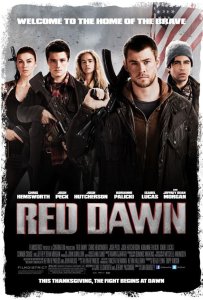
I opted to skip out on a repeat viewing of the 1984 version of Red Dawn before heading in to see this week’s FilmDistrict-distributed remake. The newer movie has so much baggage already following its delayed release and changed villains that I figured if I could walk in and spend 90-odd minutes watching an action movie about a ragtag group of young adults fighting back after the invasion of the United States by a foreign power, that would be enough. Throw in a spirited “Wolverines!” shout or two, and you’re golden. The Red Dawn remake does indeed feature a very similar setup to that of its predecessor and you will see young adults shouting “Wolverines!” at the top of their lungs. Just don’t expect much more than that.
The movie opens with a montage of newsfeed footage that serves to cast North Korea in a dangerous light. We learn all of the reasons why we’re supposed to believe that this is a worrisome overseas enemy, despite the undisputed fact that the U.S. military force is superior in every conceivable way. This brings us to Red Dawn‘s most difficult-to-swallow pill: the far-fetched idea that North Korea and Russia would join forces and unleash an electronics-destroying superweapon that cripples the U.S. military and opens the door for a full-scale invasion. If you’re able to swallow that idea and keep it down, accepting the rest of Red Dawn‘s ridiculousness is a breeze.

That’s not a bad thing either, as there’s a likable action movie here, albeit one that is deeply buried beneath an uneven script and a too-heavy hand in the editing room. Red Dawn is one of those rare 90-minute movies that manages to feel much longer than it really is, ditching a three-act structure in favor of a more dynamic narrative. The execution is very “safe” in some ways, with bloody violence kept to an absolute minimum and a PG-13-friendly script. The actual plotting is more unexpected though, with several key character deaths that actually feel earned and justified in the context of the larger story.
The action is where Red Dawn shines the brightest. Chris Hemsworth (The Avengers, Cabin in the Woods) exudes the same energy and charisma as an action hero that landed him the lead role in Marvel Studios’ Thor, a cast that he joined well after this remake was originally completed. He gets some help as well from Josh Peck (ATM, What Goes Up) and Josh Hutcherson (The Hunger Games, Journey 2: The Mysterious Island), as well as a late-arriving Jeffrey Dean Morgan (Watchmen, The Losers). The rest of the supporting cast certainly shows up and does their job, but there’s little room in an ensemble such as this one for anyone other than the principal names to shine.

That said, the characters are all paper-thin, with motivations and interpersonal conflicts only vaguely explored through stray bits of dialogue. Most of the development time is spent establishing Hemsworth’s and Peck’s starring Eckert siblings, brothers who were driven apart at some point in their past following the death of their mother. This information reveals itself in fits and starts as the first two-thirds of the movie unfolds, and the source of the conflict is never explicitly put into words until fairly late. You have to wonder if an earlier cut of the movie did more relationship-building within the gathered ensemble; as it stands, the end result only paints a vague picture of what these characters mean to one another.
Then there’s the changed villains, which transformed from Chinese invaders in 2010 to North Korean invaders in 2012. I’m just going to come right out and say it: this was an extremely ill-advised decision. There’s certainly an argument to be made that North Korea makes more sense as the villain in a modern context, and it’s great that the main antagonist, played by Will Yun Lee (Total Recall, Die Another Day), actually is of Korean descent (which makes you question what the filmmakers were thinking before the change), but it’s still hard to get past the fact that the “North Korean” invaders have obviously had their original Chinese dialogue dubbed over.

Conclusion
Red Dawn isn’t the disaster that it could easily have turned out to be, but it still demands just a bit too much suspension of disbelief to really sell the premise. The uneven writing and poorly developed characters don’t help, but the far-fetched claim that this is a thing that could happen is what really sinks this remake. The original Red Dawn played on Communism fears during the Cold War era and it absolutely worked within that historical context. This remake arrives against the backdrop of a very different world and it’s a much tougher sell as a result.


